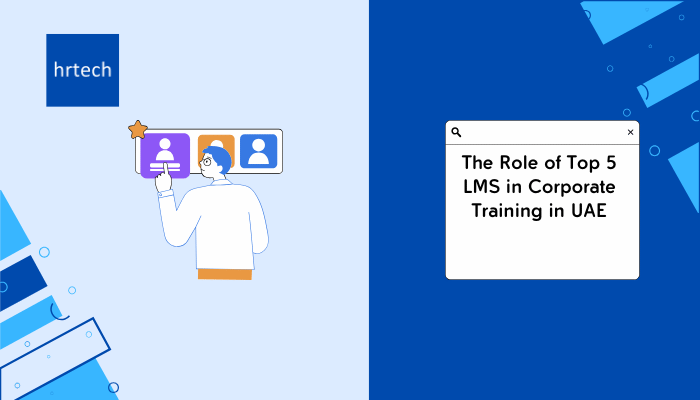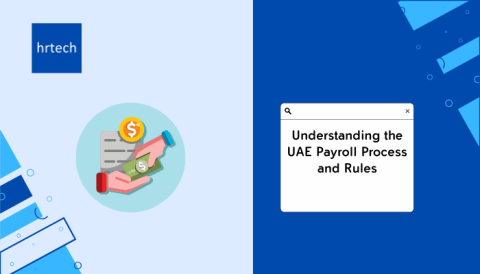Learning Management Systems (LMS) have appeared as a pivotal tool in corporate training worldwide, and the UAE is at the forefront of this digital revolution. As organizations in the UAE continue to embrace digital transformation, the demand for efficient, scalable, and cost-effective training solutions has skyrocketed.
According to Markets and Markets, the Learning Management Systems (LMS) market is booming. From $22.1 billion in 2023, it’s projected to reach $51.9 billion by 2028. This represents a strong growth rate of 18.6% annually, showing how quickly digital learning technologies are expanding in the business world. This growth is also reflected in the UAE, where businesses are increasingly adopting LMS to address the evolving demands of the workforce.
This article explores how LMS is changing corporate training in the UAE. The country’s digital innovation initiatives are driving new approaches to workplace learning. Learning Management Systems (LMS) help organizations save costs and provide flexible training options, assisting businesses to stay competitive in a rapidly changing market.
Transformative Role of LMS in Corporate Training
Various sectors are experiencing a transformation in their approach to employee learning and development through the use of LMS in the UAE. Let’s explore how LMS is making a significant impact on key industries.
“According to the Research, the global LMS market grows by 14% every year. In the US higher education LMS market, Canvas and Blackboard are the top players, each holding 28% of the market share.”
LMS platforms are providing companies across diverse industries from finance and retail to hospitality with a powerful tool to upskill their workforce, increase employee engagement, and align training with broader business objectives.
Finance Sector
The finance industry in the UAE is highly regulated, with constantly evolving compliance and industry standards. LMS in the UAE play a crucial role in delivering real-time training on regulatory updates, financial products, and compliance requirements.
LMS platforms like Paradiso LMS enable financial institutions to deliver dynamic training sessions while maintaining compliance with industry standards, all while keeping training costs under control.
Retail Sector
Retail businesses in the UAE face the constant challenge of delivering high-quality customer service and maintaining product knowledge among a diverse workforce. LMS in the UAE provide a flexible and scalable solution to deliver training to retail employees across multiple locations, ensuring that they can access training material at their convenience.
The ability to track training progress and identify skill gaps helps businesses improve sales performance and customer satisfaction.
Hospitality Sector
The UAE’s hospitality sector, renowned for its world-class service, demands high standards from its employees. LMS in the UAE empower hospitality businesses to provide consistent training across multiple branches, from customer service skills to health and safety training.
Mobile-friendly LMS platforms enable hospitality staff to learn on the go, ensuring that training is always available, even in fast-paced environments.
Key Benefits of Using LMS for Corporate Training
LMS in the UAE offers many benefits, particularly in a fast-paced, highly competitive environment like the UAE. Some of the key advantages include:
1. Flexibility and Convenience
LMS in the UAE allows employees to access training modules at their own pace, anywhere, anytime. This is especially beneficial in a region like the UAE, where employees may be spread across multiple locations or work varying shifts.
According to Edmingle, over 80% of UAE companies reported that LMS enhanced employee flexibility and engagement, improving completion rates for training programs.
“According to Edstellar, using a Learning Management System (LMS) has a big positive impact on businesses, with 72% saying it gives them a competitive edge.”
2. Cost Efficiency
LMS in the UAE eliminates the need for physical training materials, travel expenses, and in-person instructors, which can be costly. By automating training delivery, businesses in the UAE can save on logistics costs and reduce the time spent on traditional classroom training. This cost savings allows companies to reinvest in other growth initiatives.
3. Customized Learning Paths
LMS in the UAE allows businesses to create personalized learning journeys based on the employee’s role, experience, and skill gaps. This type of approach ensures that employees receive relevant training that directly aligns with their job requirements, enhancing the effectiveness of the training.
4. Tracking and Reporting
With built-in tracking and reporting features, LMS in the UAE is a powerful HR automation tool, allowing organizations to monitor employee progress and pinpoint areas for further development. These insights help HR and learning managers make data-driven decisions about employee growth, ensuring training programs align with business objectives.
5. Improved Employee Engagement
Modern LMS in the UAE incorporates gamification, simulations, and interactive elements, making learning more engaging and motivating employees to complete their courses. This leads to higher knowledge retention and better application of skills in the workplace.
Explore the hrtech marketplace to discover the best tools to boost your organization’s learning and development programs.
Comparison of Top Learning Management Systems (LMS)
When selecting an LMS in the UAE for corporate training, it’s crucial to compare the top platforms to find the best fit for your organization’s needs. Each Learning Management System offers unique features such as mobile compatibility, gamification, custom content development, and robust reporting tools.
| LMS Provider | Best For | Score |
| iSpring | Interactive eLearning content creation | 4.6/5 |
| Zoho People | HR management and employee training | 4.4/5 |
| Talent LMS | Customizable training solutions | 4.6/5 |
| Paradiso LMS | Rapid course development and mobile learning | 4.1/5 |
| Zeus Learning | Product engineering and HTML5 development | No G2 Rating |
Top LMS Providers in UAE
The selection of a suitable LMS in the UAE is crucial for businesses looking to improve their training programs. Below are some of the top LMS providers in the region, each offering unique features to cater to different business needs.
1. iSpring
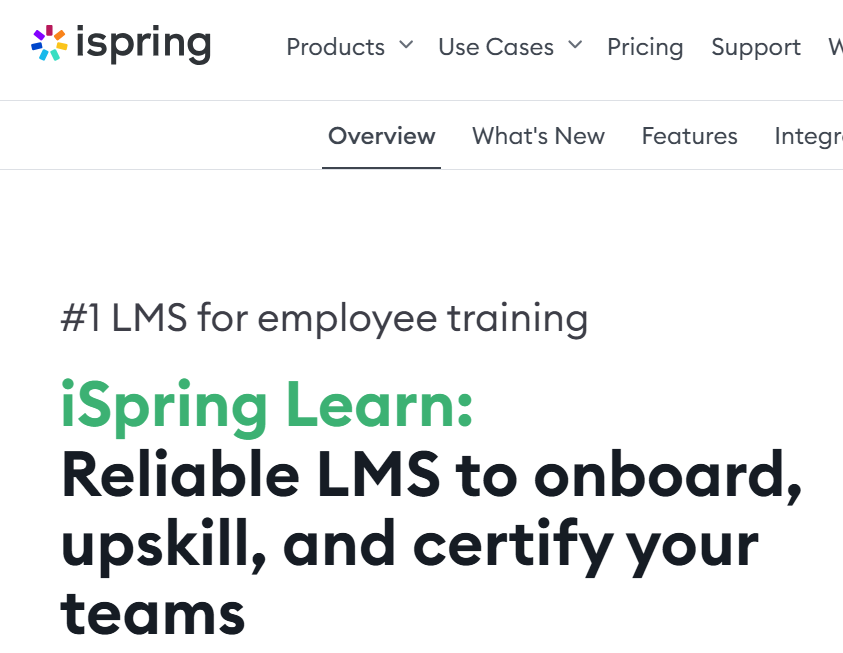
iSpring is a user-friendly LMS that makes course creation simple while offering interactive features such as video lessons, quizzes, and assessments. It’s particularly well-suited for businesses that need to develop eLearning software quickly and efficiently.
Key Features:
- Interactive Learning: Supports various content formats like videos, quizzes, surveys, and assessments.
- User-Friendly Interface: The platform is intuitive and easy to navigate, which reduces the learning curve for both administrators and learners.
- Integration with Existing LMS: iSpring integrates seamlessly with other learning management systems, making it a good choice for businesses already using a different platform.
- Mobile-Friendly: Courses are fully responsive, providing a seamless learning experience on smartphones and tablets.
- SCORM, xAPI, AICC Compliance: Fully compatible with industry-standard tracking and reporting protocols.
Pros:
- Ease of Use: Intuitive and quick to implement, making it ideal for businesses with limited technical expertise.
- Quick Course Development: Provides rapid course authoring tools that help businesses deploy training fast.
- Integration-Friendly: Easily integrates with existing systems, which is beneficial for larger organizations that need to connect their LMS with other platforms.
Cons:
- Limited Advanced Features: While great for beginners, iSpring lacks some advanced features and customization options offered by other LMS.
- Primarily Focused on eLearning: Not the best option if your organization requires extensive in-person or blended learning options.
Pricing : The Start plan is priced at $6.70 USD per user/month, billed annually. This plan provides access to essential LMS features, making it an affordable option for companies looking to implement effective training programs.
2. Zoho People
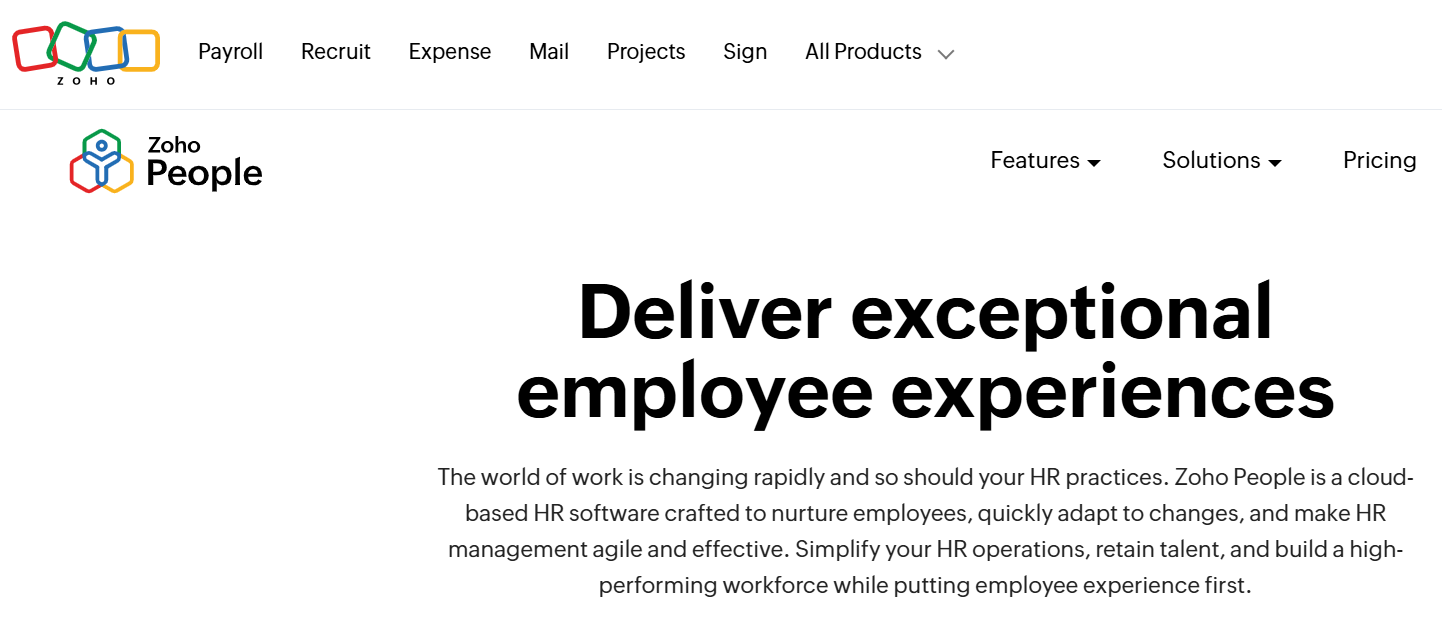
Zoho People is an all-in-one HR platform that also provides a robust LMS in the UAE feature. It allows businesses to automate employee training programs, track progress, and create customized learning paths. Its integration with other Zoho applications makes it a solid choice for small to medium-sized businesses in the UAE looking for a comprehensive HR solution with a powerful LMS.
Key Features:
- Employee Self-Service: Employees can access their training materials and track progress independently.
- Custom Learning Paths: Businesses can create personalized training programs to specific roles or departments.
- Automation: Automates the enrollment process and scheduling of training programs, reducing administrative overhead.
- Integrated HRMS: Zoho People’s integration with HR tools allows businesses to manage both employee data and training in one platform.
- Cloud-Based: Accessible from any device, anywhere, at any time.
Pros:
- Cost-Effective: Affordable for small to medium-sized businesses compared to more feature-heavy systems.
- Comprehensive HR Integration: Combines HR and LMS features in one platform, making it easier to manage employee data and training.
- Automation: Reduces administrative workload through automated training schedules and employee tracking.
Cons:
- Limited Customization: While it offers some customization options, the flexibility may be less than other dedicated LMS platforms.
- Learning Curve for New Users: Businesses new to Zoho People may need time to fully leverage all of its features.
Pricing: Zoho People offers two pricing plans: the Essential HR plan at 0.57$ per user/month, billed annually, which includes features like employee onboarding, self-service, and time-off management. The Professional plan is priced at 1.14$ per user/month, billed annually, and provides advanced features such as customizable workflows, module-based reporting, and enhanced HR process management.
3. Talent LMS
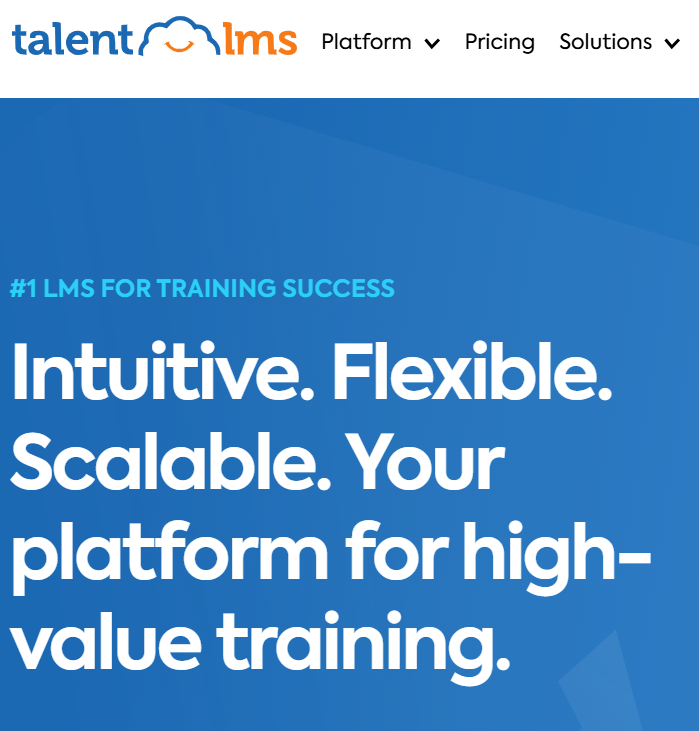
Talent LMS is a cloud-based platform designed for simplicity and scalability, with a focus on user experience and easy content delivery. It supports various content formats, including videos, documents, quizzes, and surveys, and features detailed reporting and analytics tools to track employee performance.
Key Features:
- Cloud-Based: Ensures scalability and accessibility, allowing employees to access the system from anywhere.
- Custom Branding: Businesses can customize the look and feel of their learning platform to align with their brand identity.
- Advanced Reporting: Offers detailed analytics on employee progress, engagement, and training outcomes.
- Content Variety: Supports a wide range of content formats including SCORM-compliant files, videos, quizzes, and surveys.
- Gamification: Incorporates gamified elements like points, badges, and leaderboards to increase learner engagement.
Pros:
- User-Friendly Interface: Talent LMS is known for its simple, easy-to-navigate interface.
- Scalability: The platform is highly scalable, making it suitable for both small businesses and larger enterprises.
- Affordability: Competitive pricing makes it accessible to companies of all sizes, particularly small to mid-sized organizations.
Cons:
- Limited Customization: Some users feel that it lacks the deep customization options available in more advanced LMS platforms.
- Basic Mobile Support: While mobile access is available, it may not offer the same level of responsive design as some other LMS platforms.
Pricing: Talent LMS offers two pricing plans: a Core plan at $89/month with essential features for up to 40 users and a Grow plan at $139/month with advanced features like TalentCraftAI. Both plans are billed annually and include a free trial.
4. Paradiso LMS
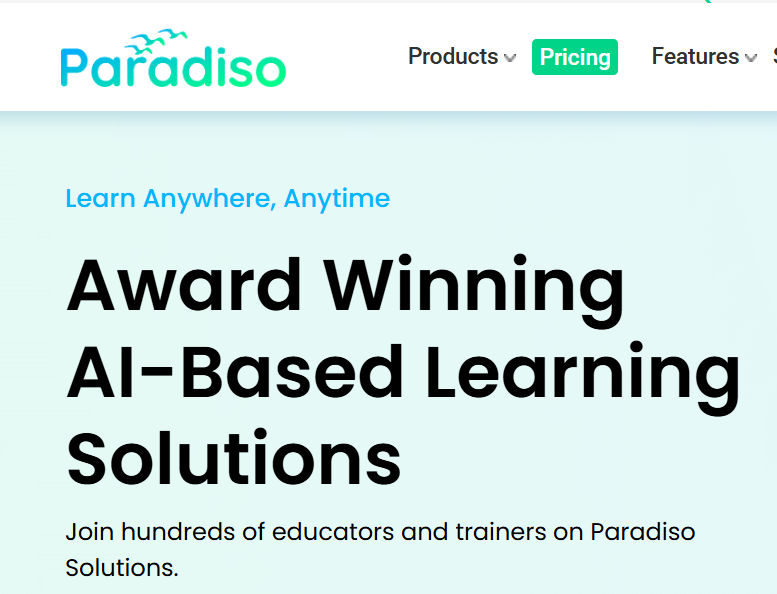
Paradiso LMS is a comprehensive learning management system that is particularly well-known for its rapid course development capabilities and mobile learning support. Its gamification features and simulation-based training enhance employee engagement and retention, making it ideal for industries that require a dynamic learning experience. It also supports integration with over 1,000 third-party applications, which allows businesses with complex learning needs to fully customize their LMS solution.
Key Features:
- Rapid Course Development: Paradiso allows businesses to create courses quickly with its user-friendly course authoring tool.
- Mobile Learning Compatibility: With mobile-responsive designs, employees can access training materials on-the-go.
- Gamification and Simulations: Encourages learner engagement through elements like badges, leaderboards, and simulation-based learning scenarios.
- Third-Party Integration: The system supports integration with over 1,000 applications, from HRMS tools to CRM software, making it adaptable to complex business environments.
- SCORM, Tin Can API, and AICC Compliance: Full compatibility with popular standards for content delivery and tracking.
Pros:
- Scalability: Suitable for both small businesses and large enterprises.
- Enhanced Engagement: Gamification and simulation tools significantly increase learner interaction.
- Customizable: Highly adaptable to specific business needs thanks to its broad integration capabilities.
Cons:
- Learning Curve: The wide range of features can be overwhelming for new users without adequate training.
Pricing: Paradiso LMS pricing details are not publicly listed. Exact pricing can be obtained by contacting their sales team directly.
5. Zeus Learning
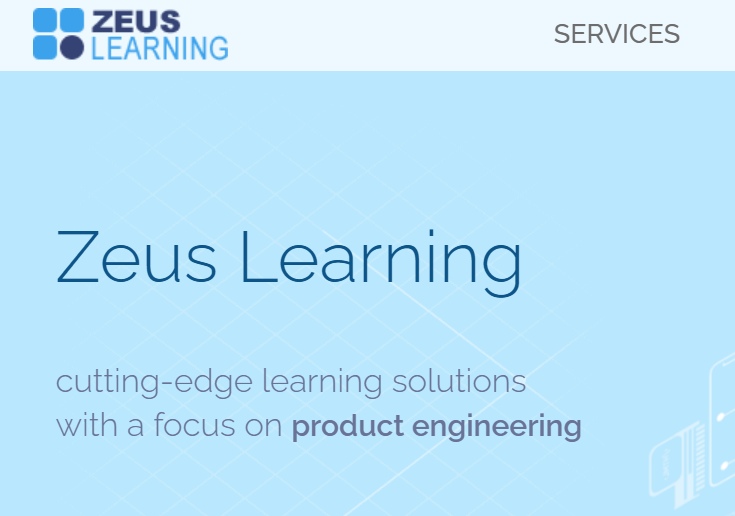
Zeus Learning specializes in mobile and HTML5-based development, allowing businesses to create responsive and engaging learning experiences. They also offer custom content development services, making them a great choice for companies that need best training solutions for unique or niche industries.
Key Features:
- Mobile-Responsive Learning: Zeus LMS is optimized for mobile use, ensuring that employees can access training from any device.
- Custom Content Development: Offers specialized services for creating unique, branded training material for organizations.
- HTML5-Based Learning: Supports rich media and interactive content, which is essential for delivering an engaging learning experience.
- Cloud Hosting: Zeus LMS is cloud-based, ensuring scalability and accessibility.
Pros:
- Responsive Design: Learning is accessible from mobile devices, tablets, and desktops, making it highly flexible.
- Great Solutions: Custom content development allows companies to create exactly what they need, which is ideal for specialized industries.
- Excellent Customer Support: Known for providing responsive customer service and assisting with LMS customization.
Cons:
- Limited Reporting Features: Some users have noted that the reporting and analytics features are less comprehensive than other platforms.
Pricing: Zeus Learning’s pricing details are private on their website. Interested businesses would need to contact their sales team directly to get a customized quote for their LMS solution.
In summary, the UAE provides a variety of high-quality Learning Management System (LMS) providers suitable for different industries and educational needs.
Conclusion
As the UAE drives digital transformation, choosing the right Learning Management System (LMS) is crucial for companies seeking to enhance corporate training. Top LMS providers in the UAE offer flexible solutions that help businesses across sectors from finance to hospitality and improve training, compliance, and employee development.
Investing in a Learning Management System (LMS) helps UAE businesses streamline training and develop a skilled workforce that can adapt to rapidly changing market demands. By choosing the right LMS, companies can empower employees and drive success in the digital era. For more information on selecting the perfect LMS for your organization, contact us at hrtech today!
